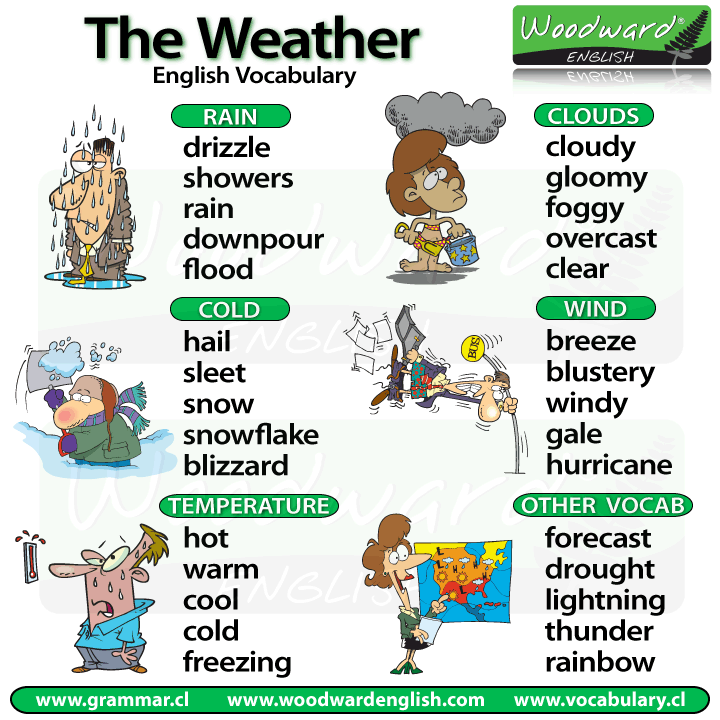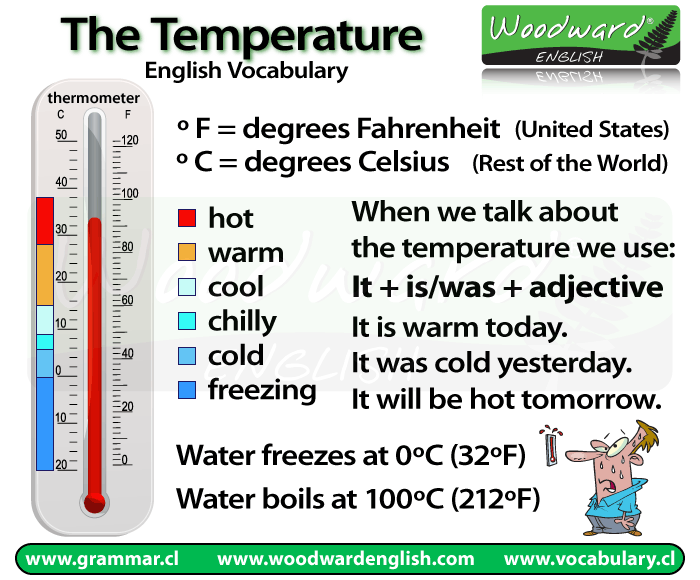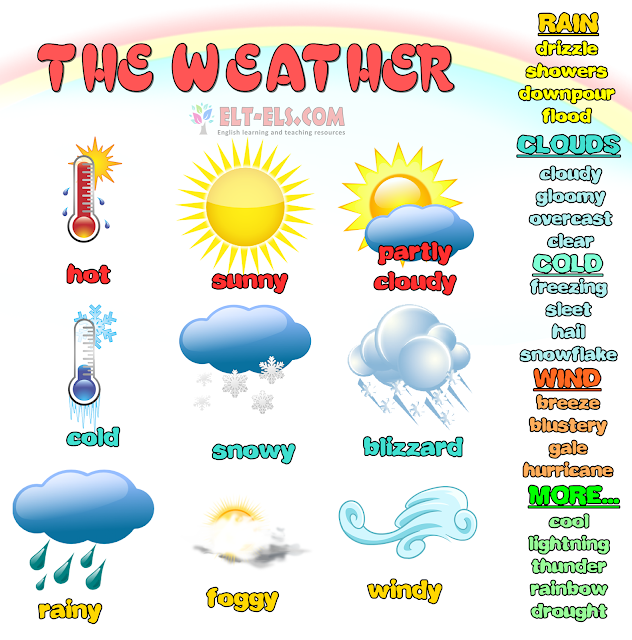The Weather in English
In English, we usually use it is when we talk
about the weather.
This is normally: It is + adjective OR It is +
verb-ing
It is + adjective =
A description of the weather
- It is sunny today.
- It's hot and humid today.
- It's a nice day today.
- It is a + adjective + day (or morning/afternoon/night)
- It's a fine day.
- It's a windy afternoon.
It is + verb-ing =
This type of weather is happening now.
- It’s drizzling outside.
- It’s snowing.
- Take an umbrella, it’s raining.
You can also use it is in different tenses
- It was cold yesterday.
- It will be cloudy tomorrow.
- Rain: (noun) The game was cancelled because of the rain.
- Rain: (verb) I think it is going to rain later.
- Rainy: (adjective) It's a rainy day.
It pays to learn the different forms of each
word and when they are used.
Nouns and Adjectives
Many times when we are talking about the
weather, we can add the letter Y to the end of a noun to make it an adjective.
- rain (noun) - rainy (adjective)
- sun (noun) - sunny (adjective)
- wind (noun) - windy (adjective)
- cloud (noun) - cloudy (adjective)
- fog (noun) - foggy (adjective)
Questions
about the weather
People commonly ask about the weather by
saying:
- What's it like out(side)?
- How's the weather?
- What's the weather like?
- What's the temperature?
- What's the weather forecast?

Vocabulary about the weather in English
We have divided this vocabulary into different categories to make it easier. We have:
Clear or Cloudy – Types of Rain – Cold stuff – Types of Wind – Mixed Vocabulary
Clear or Cloudy
Bright: (adjective) full of light; when the sun is shining strongly
Sunny: (adjective) the sun is shining and there are no clouds
Clear: (adjective) without clouds
Fine: (adjective) not raining, clear sky
Partially cloudy: (adjective) when there is a mixture of both blue sky and clouds
Cloudy: (adjective) with many clouds in the sky
Overcast: (adjective) covered with cloud; dull
Gloomy: (adjective) with dark clouds and dull light; some people consider this weather depressing
Sunny: (adjective) the sun is shining and there are no clouds
Clear: (adjective) without clouds
Fine: (adjective) not raining, clear sky
Partially cloudy: (adjective) when there is a mixture of both blue sky and clouds
Cloudy: (adjective) with many clouds in the sky
Overcast: (adjective) covered with cloud; dull
Gloomy: (adjective) with dark clouds and dull light; some people consider this weather depressing
Sometimes the cloud lowers to ground level and it becomes harder to see…
Fog (noun)/ foggy (adjective): thick cloud close to land
Mist (noun) / misty (adjective): light fog, often on the sea or caused by drizzle
Haze (noun) / hazy (adjective): light mist, usually caused by heat
Fog (noun)/ foggy (adjective): thick cloud close to land
Mist (noun) / misty (adjective): light fog, often on the sea or caused by drizzle
Haze (noun) / hazy (adjective): light mist, usually caused by heat
Types of Rain
Damp: (adjective) slightly wet (often after the rain has stopped)
Drizzle: (verb/noun) to rain lightly with very fine drops
Shower: (noun) a short period of rain
Rain: (verb/noun) water that falls from the clouds in drops
Downpour: (noun) heavy rain
Pour: (verb) to have heavy rain
It's raining cats and dogs: (Idiom) To rain heavily
Torrential rain: (noun) very heavy rain
Flood: (verb/noun) to become covered in water usually due to excessive rain
Drizzle: (verb/noun) to rain lightly with very fine drops
Shower: (noun) a short period of rain
Rain: (verb/noun) water that falls from the clouds in drops
Downpour: (noun) heavy rain
Pour: (verb) to have heavy rain
It's raining cats and dogs: (Idiom) To rain heavily
Torrential rain: (noun) very heavy rain
Flood: (verb/noun) to become covered in water usually due to excessive rain
Cold stuff
Hail: (verb) when frozen rain falls as small balls of ice (hailstones).
Hailstones: (noun) the small hard balls of ice that fall from the sky
Snow: (noun/verb) frozen rain that falls from the sky as soft snowflakes
Snowflake: (noun) an individual piece of snow
Sleet: (noun/verb) snow or hail mixed with rain (often with some wind)
Blizzard: (noun) severe snowstorm with strong winds
Hailstones: (noun) the small hard balls of ice that fall from the sky
Snow: (noun/verb) frozen rain that falls from the sky as soft snowflakes
Snowflake: (noun) an individual piece of snow
Sleet: (noun/verb) snow or hail mixed with rain (often with some wind)
Blizzard: (noun) severe snowstorm with strong winds
Types of Wind
Breeze: a gentle wind (often nice or refreshing)
Blustery: blowing (strong) gusts of wind
Windy: continual wind.
Gale: a very strong wind
Hurricane/cyclone/typhoon: a spiral arrangement of thunderstorms that produce winds and heavy rain.
Blustery: blowing (strong) gusts of wind
Windy: continual wind.
Gale: a very strong wind
Hurricane/cyclone/typhoon: a spiral arrangement of thunderstorms that produce winds and heavy rain.
What's the difference between a hurricane, a typhoon and a cyclone?
They are the same thing just with different names because of the region they are in.
Atlantic/Northeast Pacific = a hurricane
Northwest Pacific = a typhoon
Southern Hemisphere = a cyclone
Tornado: (noun) strong violent circular winds in a small area; a rapidly revolving column of air
In United States the word twister is often used instead of tornado.
In United States the word twister is often used instead of tornado.
The Temperature in English
The temperature is how hot or cold something is.
We use a thermometer to measure the temperature of something.
Temperature is usually measure in degrees.
We use a thermometer to measure the temperature of something.
Temperature is usually measure in degrees.
The ° symbol after a number means degrees.
30° = thirty degrees
30° = thirty degrees
There are two main systems used for measuring temperature:
°F = degrees Fahrenheit (only used in United States)
°C = degrees Celsius (used in the rest of the world)
°F = degrees Fahrenheit (only used in United States)
°C = degrees Celsius (used in the rest of the world)
When talking about the temperature we normally use:
It + is/was/will be + adjective
It + is/was/will be + adjective
- It is chilly today.
- It was warm yesterday.
- It will be cold tomorrow.
Here is a chart showing temperature vocabulary:

The temperatures given are only an approximation to give you an idea of when to use them.
28°C (or more) - Hot
15 to 28°C - Warm
10 to 15°C - Cool
5 to 10°C - Chilly
0 to 5°C - Cold
0°C (or less) - Freezing
15 to 28°C - Warm
10 to 15°C - Cool
5 to 10°C - Chilly
0 to 5°C - Cold
0°C (or less) - Freezing
Remember, what is hot in one country may only be considered warm in another.
What may be chilly in one country may be freezing in another.
What may be chilly in one country may be freezing in another.
The following words refer to being MORE than hot and are used for temperatures over 30°C.
Boiling: very hot, often used in negative contexts
Humid: hot and damp. It makes you sweat a lot
Muggy: warm and damp in an unpleasant way
Scorching: very hot, often used in positive contexts
Stifling: hot and you can hardly breath
Sweltering: hot and uncomfortable
Humid: hot and damp. It makes you sweat a lot
Muggy: warm and damp in an unpleasant way
Scorching: very hot, often used in positive contexts
Stifling: hot and you can hardly breath
Sweltering: hot and uncomfortable
So what makes a day hot or cold? It depends on the weather…
More vocabulary about the weather
Drought: (noun) Long periods of time without rain causing a lack of water in the area
- A lot of the crops dried up because of the drought.
Forecast: (noun) A prediction of how the weather will be on a certain day
- The forecast says it's going to rain tomorrow.
Lightning: (noun) A flash of light in the sky during a storm.
- Lightning lit the sky many times that night.
Puddle: (noun) a small pool of water on the ground, usually after rain.
- The kids jumped in the puddles on the way home from school.
Rainbow: (noun) an arch of colors in the sky formed when the sun shines through rain
- I took a photo of a beautiful rainbow that was just above the lake.
Smog: (noun) a cloud of pollution hanging over a city (a fog of smoke)
- The view of the city wasn't very good because it was covered in thick smog.
Sunburn: (noun) painful red skin caused by spending too long in the hot sun.
- If you don't put on your sunscreen, you'll get sunburn.
Sunshine: (noun) the light and heat of the sun
- I could feel the warm sunshine on my back.
Thunder: (noun/verb) the rumbling sound in the clouds that happens after lightning
- The cat hid inside because it was scared by the thunder.
Questions using weather vocabulary
- What's the weather like in Buenos Aires in January?
- How's the weather in Moscow in winter?
- It's pretty hot. What's the temperature?
- Is it raining outside?
- What's the forecast for tomorrow?
GAME





No comments:
Post a Comment